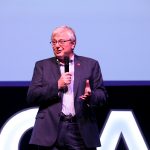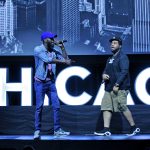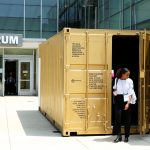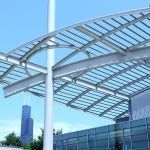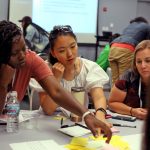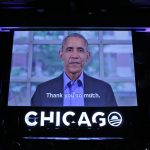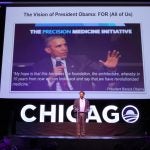Obama Foundation hosts Community Conversation at UIC
Photos: Jenny Fontaine
With University of Illinois at Chicago Chancellor Michael Amiridis standing alongside him before hundreds of grass-roots leaders, Obama Foundation CEO David Simas recalled how the former president told him in 2016 that his best work was still to come.
That work, creating stronger communities, was on display Tuesday at the Isadore and Sadie Dorin Forum at UIC, where the foundation hosted the Chicago Community Conversation.
The event included daylong panel sessions on issues ranging from social justice initiatives, youth as game changers, building strong communities, using art and museums to represent communities, and the availability of health care in underserved communities. The foundation plans a series of these discussions around the country and internationally, including an upcoming gathering in Johannesburg, South Africa.
“We looked at him (Obama) and said, ‘What?’,” Simas said. “He said, ‘I want to devote the rest of my life to creating an institution whose sole mission is to inspire and empower the next generation of leaders to change their world.’ That is our North Star.”
UIC hosted the group’s first major program because of its early commitment to bringing the Obama Presidential Center to Chicago, Simas said.
“When the President and Mrs. Obama were deciding where to put the Obama Presidential Center, UIC was one of the first institutions that said, ‘Because of that focus on civic engagement and leadership, it must be here,’” Simas said.
Amiridis said that UIC’s relationship with the foundation was a strong one built on many “common values” that the university has maintained throughout the last 50 years.
“We also have a common desire for change and opportunity,” Amiridis said. “This institution (UIC) was created by and for the people of Chicago, and it was created on the principles of public service, civic engagement and social justice.
“We are providing solutions to some of the toughest social crises that we are facing.”
A pre-recorded video featured former President Barack Obama, who referred to the fact that the gathering coincided with Juneteenth, the annual celebration of the emancipation of enslaved black people in confederate states and the announcement of the abolition of slavery in Texas — two years after the Emancipation Proclamation became law.
“We have a lot to learn from you, about what you’ve been doing to make change possible. Change isn’t easy; sometimes it can seem like progress comes frustratingly slow. I know that firsthand. But sometimes, to strengthen my faith, I think about citizens like you,” Obama said.
Lisa Yun Lee, UIC professor of art and art history, referenced the Juneteenth anniversary in a talk on what it means to be free when there is so much inequality.
“What does it mean to be free on this anniversary in a city where almost 8,000 human beings are locked in the cages of the Cook County Jail, and what does it mean to be free on this anniversary in a nation where families are being torn apart at the border,” said Lee, who is executive director of the National Public Housing Museum. “We come together on this day — like on all days — to do what Chicagoans have always done when faced with great injustice. We organize. Because none of us are free until all of us are free.”
The event drew notable activists and leaders such as Billy Branch, a Grammy Award-nominated blues musician and UIC alum; Rami Nashashibi, MacArthur Genius Award winner and founder of the Inner-City Muslim Action Network; Masequa Myers, executive director of the South Side Community Arts Center, and Grammy Award-winning artist Daveed Diggs.
Another issue discussed was how inequality and lack of resources in poorer communities can have major and long-lasting repercussions on health care issues that are passed down from one generation to the next, said Dr. Robert Winn, associate vice chancellor for community based practice and director of the University of Illinois Cancer Center.
Winn, who also is a professor of medicine at UIC, said there is an important connection between science and social justice issues, and he pointed to violence, lack of access to healthy food choices, and environmental issues as having long-ranging consequences.
“Science is here, it’s just unevenly distributed,” Winn said. “Our challenge is to do good, not for some, but for all.”
